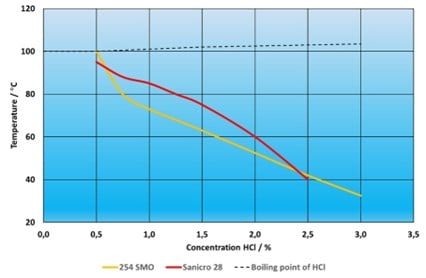Heat exchangers are crucial in process industries. These include refineries, petrochemical, and chemical plants. They heat and cool process streams. They conserve energy in the plant and minimize additional heat from external sources by burning gas or oil or using electricity. The most common industrial heat exchanger is the shell-and-tube type.
Process fluids in heat exchangers are highly corrosive. Proper material selection is critical. Get it right and it can reduce failures, maintenance, and repair costs. And that’s not all. A corroding heat exchanger can contaminate your products. You could be faced with paying for expensive purification or, worse still, a non-sellable product.
Alleima advances industries through material technology. Our development and manufacture of advanced stainless steel and special alloys is world-leading. We aim to break through the corrosion resistance demands of shell and tube heat exchangers. We’re supported by more than 160 years of research, product development, and expertise. When we see a customer’s challenge we won’t stop until we deliver an improved solution.
How to Boost the Life of Your Heat Exchanger
A customer with a petrochemical plant in the Nordic region was frequently buying Alleima® 254 SMO* tubes for a shell-and-tube heat exchanger.
Alleima 254 SMO* is a high-alloy austenitic stainless steel developed for seawater and other aggressive chloride-bearing media.
The tubes were experiencing a short life in the heat exchanger. We contacted our customer to investigate if changing the material could accelerate the life of the tube bundle and reduce their overall costs.
Together, we analyzed the process conditions. We discovered hydrochloric acid was condensing in the lower part of the tube bundle, causing rapid corrosion of the tubes in that area. Hydrochloric acid is well known to be very corrosive for stainless steel alloys, even high-alloyed grades like Alleima® 254 SMO*.
We looked for a replacement material that would extend the life of the tubes.
Sanicro® 28 for Heat Exchanger Tubing
Sanicro® 28 is a high-alloyed multi-purpose austenitic stainless steel designed specifically for highly corrosive conditions.
Sanicro® 28 has better resistance than Alleima 254 SMO* to hydrochloric acid. It’s alloyed with 27% chromium and 31% nickel, compared 20% chromium and 18% nickel for Alleima® 254 SMO*. This means lower corrosion rates and a longer life for the tubes even if corrosion occurs. Material perfection.

Iso-corrosion lines for Alleima® 254 SMO* and Sanicro 28, drawn at 0.1 mm/year corrosion rate.
Driving Corrosion Resistance in Heat Exchangers
Following our advice, when the time came to replace their Alleima® 254 SMO* tubes, our customer chose Sanicro® 28.
After six months in service, the process stream from the heat exchanger showed almost negligible metal ions, indicating very low corrosion. And a year later, the tube bundle showed no signs of corrosion.
After this inspection, the customer told us: “We’re extremely satisfied with this solution and your guidance during the design.”
We are a progressive partner for our customers. They can rely on us to always move them forward. How can we help solve your heat exchanger tubing challenges today?
To find out contact us here.
*Trademark information: 254 SMO is a trademark owned by Outokumpu
